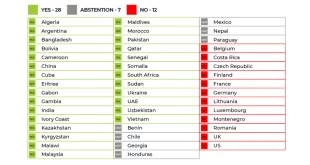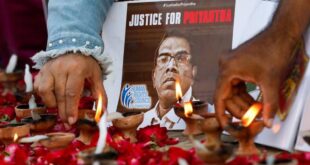Demonstrators show an image of Rizana Nafeek during a protest in Colombo on January 11, 2013, against her execution. (Reuters)
The Kingdom said yesterday that the execution of Rizana Nafeek, a Sri Lankan maid who was convicted of killing a baby in her care in 2005, was carried out according to the laws of the land and statements made by foreign organizations were incorrect.
An official statement said the sovereignty of the judiciary and rules and regulations will be maintained in the country for the benefit of citizens and residents and that the Kingdom would not allow any interference in its affairs.
The statement said the government noted with regret various statements made by the United Nations secretary-general, vice president of the European Commission, high representative of the Union for Foreign Affairs and Security Policy, spokesman from the Office of the United Nations High Commissioner for Human Rights and other agencies and foreign organizations on the implementation of the court ruling sentencing the housemaid for killing the four-month-old infant.
A Saudi government spokesman said the facts in the statements were incorrect.
Nafeek had only been in the Kingdom a week when the infant's death took place.
Furthermore, it was revealed that the convicted housekeeper was not underage at the time of the incident. According to her official passport, she was 21 years old. It is an internationally accepted fact that information given in the passport is accepted for all legal purposes. Moreover, the legal regulations of the Kingdom of Saudi Arabia do not allow the recruitment of minors.
Secondly, according to the statement, the maid was tried from the lower courts of justice to the highest court. The verdict for homicide was affirmed by the Supreme Judicial Commission of the Kingdom.
During the trial, Nafeek was given the right to defend herself and lawyers appeared on her behalf, supported by the Sri Lankan mission in Riyadh.
Thirdly, soon after the final verdict was passed, the government referred her case to Reconciliation Committee under the Riyadh governorate to negotiate with the parents of the deceased child either to pardon the convict on sympathetic grounds or to accept an offer of blood money. The efforts for negotiations with the deceased family failed since the aggrieved parents were unwilling to compromise. The Sri Lankan Embassy in the Kingdom also appreciated the efforts made by the Saudi government to obtain a pardon from the parents of the deceased child. Sri Lanka's attorney general and a senior official from the External Affairs Ministry in Colombo who came to Riyadh on a visit, were fully briefed on the entire process and efforts made by the government in Nafeek's case. They were also informed that negotiations with the aggrieved parents had failed.
Meanwhile, Sri Lanka's Foreign Employment Promotion and Welfare Minister Dilan Perera said Saturday that his government, in cooperation with Saudi authorities, tried all possible means to save the life of Rizana Nafeek, who was executed in Dawadami on Wednesday.
Dilan Perera was speaking at a condolence meeting in memory of Nafeek at the Dewatagaha Mosque in Colombo.
Sri Lanka denied reports yesterday that its ambassador in the Kingdom was recalled due to the execution of Rizana Nafeek. “We transferred the present Ambassador Ahmed A Jawad to Colombo upon the completion of his tour of duty in the Kingdom,” Karunatilake Amunugama told Arab News from Colombo yesterday. Ambassador Jawad's three-year term ended Dec. 9.
Amunugama said that there is no question of downgrading the embassy since this is a routine transfer. He also said that Jawad will be replaced by another ambassador who will soon be formally appointed.
Post Disclaimer | Support Us
Support Us
The sailanmuslim.com web site entirely supported by individual donors and well wishers. If you regularly visit this site and wish to show your appreciation, or if you wish to see further development of sailanmuslim.com, please donate us
IMPORTANT : All content hosted on sailanmuslim.com is solely for non-commercial purposes and with the permission of original copyright holders. Any other use of the hosted content, such as for financial gain, requires express approval from the copyright owners.
 Sri lanka Muslims Web Portal Diversity and Inclusiveness
Sri lanka Muslims Web Portal Diversity and Inclusiveness





i have updated the link on the main comment.
source : http://www.countercurrents.org/munas130113.htm
They made her kneel and extend her neck, severing her young head with an unmerciful swish of a sword, shortly before noon on Wednesday, January 9, 2013. The forlorn woman was publicly beheaded by the pitiless Saudis in the town square of Dawadmi in Saudi Arabia, slaughtered like an animal for everyone to see, her separated head dropping to the ground with a muffled thud. Her name was Rizana Nafeek and she was from Muttur in Sri Lanka.
The tragedy of Rizana Nafeek is a gruesome story of innocence betrayed, the ghoulish tale of a precious life destroyed. It began in 2005 when Rizana, hardly seventeen, left her impoverished homeland of Sri Lanka to work as a servant maid in the oil-rich country of Saudi Arabia. She had embarked on this ill-fated journey to support her penurious family at home — they lived in a decrepit shack, her father scavenged and sold firewood from the surrounding jungle for their sustenance, her desperate parents could not adequately provide for the children. Young Rizana, fired by the dreams and the innocence of youth, aspired to make a difference for her family with the relatively handsome wages she hoped to earn as a servant in Saudi Arabia.
Rizana arrived in Riyadh on May 4, 2005. She was immediately sent to work in the household of her sponsoring employer in the town of Dawadmi in central Saudi Arabia. Besides her numerous housekeeping tasks, she was ordered to care for her employer’s infant child who was about four months old at the time. While tending the infant on May 22, 2005, the baby choked while feeding and died as the maid frantically tried to save the child's life.
Rizana and the baby were in a room by themselves when this happened. As the distraught maid shrieked in horror, the infant’s absent mother who did not witness any of the antecedents, now rushed into the room and instantly accused Rizana of murdering the child.
Rizana was arrested on the spot. She was forced to confess to a crime she did not commit by the Saudi police using inhuman duress, then convicted of murder without any access to due process or the presumption of innocence. On June 16, 2007, the authorities sentenced the miserable maid to death by public beheading. Rizana subsequently stated she was threatened and beaten by the local police into signing the “confession.” No reason was given at the time of the one-sided trial to explain why someone who had worked hardly two weeks in a brand new country should suddenly develop a motive to murder her employer’s child. No autopsy was ever performed to ascertain the cause of death.
Rizana was abandoned by the authorities of her native Sri Lanka who did nothing to help her legally. At great financial expense, the Asian Human Rights Commission based in Hong Kong appealed the sentence to the highest Saudi tribunals, but without success. Upon confirming her execution last Wednesday, the Saudi Interior Ministry added that Rizana was beheaded because she “strangled the baby” after “a dispute with the mother.” To the best of anyone’s knowledge, no revelations of any dispute with the mother or evidence that the baby was strangled, was ever offered by the Saudi authorities during the seven years they had her incarcerated. This cynical dissembling by the Saudi government in the post-execution statement, besmirching an innocent person they had killed in cold blood, is beyond mind-boggling. Rizana’s grieving parents requested her body returned home for a decent burial. The Saudis refused and buried her in a derelict’s grave.
Rizana had many supporters around the world pleading for her young life, yet none could save her from the immoral actions of a Saudi government oblivious to human rights and natural justice. Inexplicably, the modern world leaves unchallenged the odious behavior of an irrational and medieval regime riddled with self-righteous sanctimony and intolerance, possessing no respect for human rights or gender equality. The UN High Commissioner for Human Rights must publicly denounce this monstrous abuse of a person and the unlawful death inflicted on an innocent fellow human by the custodians of a sordid system. High Commissioner Navanethem Pillay should speak out boldly against this abomination for her to have any credibility among fair-minded people around the world, and if she wishes to demonstrate that her Commission has a conscience.